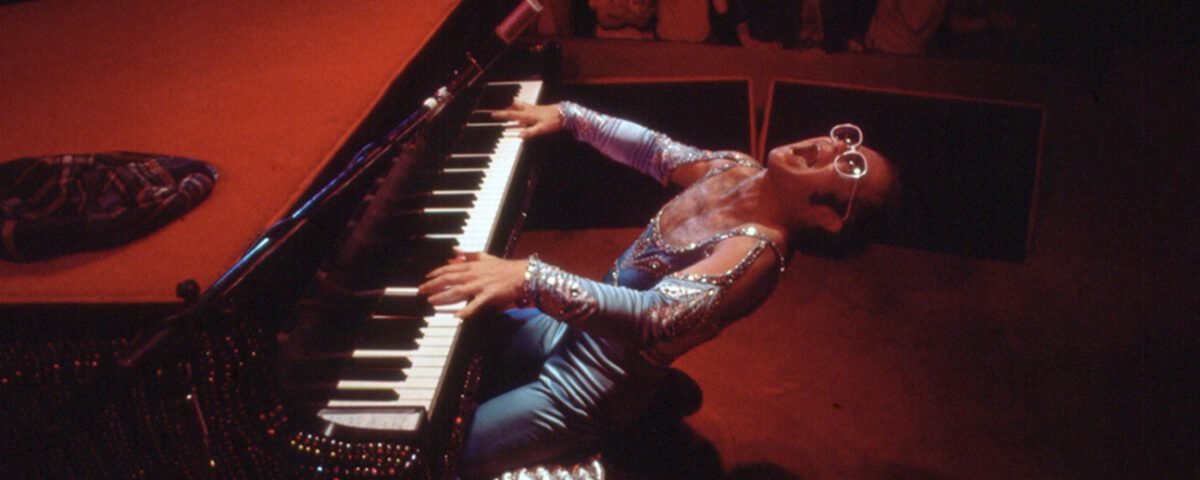


‘The Killer’s Game’ Review: Dave Bautista Charms in an Enjoyably Violent but Otherwise Creaky Action-Comedy
September 17, 2024


‘Transformers One’ Review: Chris Hemsworth and Brian Tyree Henry Lead a Delightful, Franchise-Revitalizing Prequel
September 18, 2024Co-directed by R.J. Cutler and the subject’s husband, David Furnish, the Disney+ doc surveys the performer’s heyday as he prepares for a farewell stadium show.
Elton John: Never Too Late
Still standing, just not saying a lot that’s new.
For a film co-directed by its subject’s husband, David Furnish, Elton John: Never Too Late, while always entertaining, feels curiously impersonal and lacking in intimacy. If you want to revisit the glory days of John’s career, when he released an astonishing 13 albums in the five-year span of 1970-75, seven of which reached No. 1 on the Billboard charts, the Disney+ doc is a goldmine of exhilarating concert footage, interview clips and photographs that reveal John both in high-energy performance mode and low-spirited solitude. Fans will eat it up. But the contemporary perspective of a parallel track in which he prepares to play a farewell show is anemic.
Directors R.J. Cutler and Furnish build their portrait around audio tapes of a series of conversations with Alexis Petridis, a music critic at The Guardian, as John was preparing to pen his memoir. Petridis also served as ghostwriter on that 2019 publication, titled without false modesty, Me. Their chats, focusing on the performer’s 1970s heyday, are convivial sit-downs that go light on hard questions — at least in what we hear of them. John’s autobiography is distinguished by its candor, and its healthy balance of self-mockery and self-knowledge. If only more of that had carried over into the film.
Instead, we get some lovely stage snippets along with more private glimpses of John — warmly thanking his band; being a loving father on a video call to his two young sons back in England; recording his Rocket Hour radio show, on which he’s an avid cheerleader for emerging talent. The access seems carefully controlled, however, rarely revealing.
In the Petridis conversations and additional commentary by John, he outlines a life story that will be familiar to longtime fans from previous documentaries, specials, profile pieces, his autobiography and the 2019 biopic Rocketman, in which he was played by Taron Egerton.
That’s not to say there isn’t poignancy in the paradox of a global superstar, adored by millions but saddened by the emptiness inside him, as John puts it. He admits there was nothing in his life back in those supposed golden years but success and drugs, and later, an abusive relationship with John Reid, who became his manager and introduced him to cocaine.
He’s more voluble on his unhappy childhood, spending time in his own fantasy land while his abusive parents argued; on his virtuoso piano skills from a young age, gaining him attention where before he had felt invisible; on his discovery at the Royal Academy of Music that classical music wasn’t his thing.
Propelled by editors Greg Finton and Poppy Das’ zippy montage, with sharp use of split-screen and slick animated sequences, the film guides us through his early formation of a band that opened for the Drifters, the Temptations and Patti LaBelle. Around this time, he also changed his name from Reginald Dwight, intuiting that Reg could never amount to anything but Elton could.
The encounter with lyricist Bernie Taupin that would prove so foundational to John’s success came by chance when he fronted up for a record company interview and was waved off with a batch of Taupin’s lyrics. In one terrific TV interview clip, he sits at the piano with the hand-written lyrics for “Tiny Dancer,” explaining how certain key words like “ballerina” almost dictated the tempo and chords.





